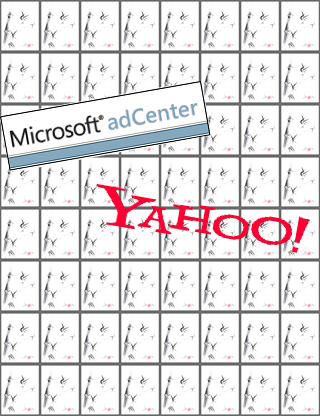Yahoo & MSN: non Zen+non Zen=? (Guest Post)
 Yahoo: decidedly Non-Zen
Yahoo: decidedly Non-Zen
Today MSN announced a bid to acquire Yahoo for $44.6B. This completes Yahoo’s slow slide downhill from the top of the search Mount Olympus.
One can argue that lack of focus on Zen features, particularly Simplicity, in Yahoo’s Search Advertising business was the major force behind this slide.
1. Complexity of opening an Advertiser Account in Yahoo: It has always been difficult, time-consuming and non-intuitive to open an account in Yahoo. Before, with the old Overture interface, the difference with Google in this respect was stunning. Now, under Panama, this problem is less pronounced but it is still more difficult.
Why does it matter? An easier interface allows more “long tail” advertisers to join in, building a more populated search advertising marketplace which generates more money. Think about online auctions: sellers sell their items on eBay, not on other auction sites, because eBay has the most buyers. Thus they get the highest price for their items. Similarly, it is a no-brainer for companies like AOL to partner with Google—this way they can get the highest price for their users’ searches.
2. Complexity of opening a Publisher Account in Yahoo: It took years for Yahoo to create a program analogous to Google’s AdSense with self-serve publisher sign up. In contrast, Google’s AdSense publisher network of mostly small publishers has been a major driver of the search giant’s growth for years.
3. Complex Editorial Rules: To advertise in Yahoo, one has to be an expert on their complicated rules on what is allowed and what is not. If advertisers make many mistakes, they can be banished. In contrast, Google has much fewer rules. Even if you make a mistake, Google’s automated review through scripts will make the adjustment to your account for you.
4. Complexity of creating comprehensive keyword lists: In Yahoo or Google, advertisers bid on the specific keywords relevant to their business. In Yahoo, they generally need to identify all of the synonyms of these keywords in order to show up in search results. In Google, you don’t really need that—Google automatically identifies most of these synonyms for you. For example, if you search for “san fran refi” from my location in Palo Alto CA today, you get only 2 ads in Yahoo and 16 in Google (1, 2, 3). Very few of these 16 advertisers in Google buy the specific search phrase “san fran refi” itself. Rather, Google’s technology identifies these ads as related to that search phrase. This feature makes it easier for advertisers to cover all of their relevant searches. This is just another example, per Drue’s earlier post, when complex technology makes it simple for the customer.
Microsoft: Has it lost its (borrowed) Zen?
While Yahoo was never Zen, Microsoft arguably had some Zen aspects in its early technologies (many through copying Apple): intuitive graphical interface, common relatively simple menus in its Office applications. Its recent foray in Search, however, has been far from Zen. AdCenter, MSN’s Search Advertising product, has the least intuitive and slowest User Interface of all major search players as well as the most cluttered and inefficient API (Changing attributes of
OrderItemIDs in AdCenter’s API, anyone???)
The question is, will the Yahoo acquisition somehow trigger MicroHoo to find its Zen? Or not?
Here is a great summary of reactions recapped by Danny Sullivan.
Post by Svetlozar Kazanjiev
Director of Market Optimization and Ad Buying
Turn, Inc.



I Googled and Yahooed “Zen” and the first hit for both portals was the Wikipedia page on Zen. Out of brand loyalty and appreciation for all the free lunches I have enjoyed at the Googleplex, I clicked through Google’s page and began reading Wikipedia’s take on Zen. “Zen,” the Wiki waxes, “holds that these things (text, verbal discourse) lead the practitioner to seek external answers, rather than searching within their own minds…” and “The importance of Zen’s non-reliance on written words is often misunderstood as being against the use of words.”
Clearly, it’s not Zen to search-and-surf “Zen”!